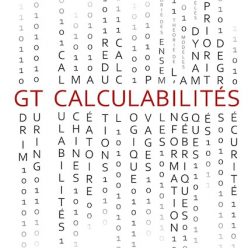CiE 2019 is the 15th conference organized by CiE (Computability in Europe), a European association of mathematicians, logicians, computer scientists, philosophers, physicists and others interested in new developments in computability and their underlying significance for the real world.
CiE 2019: Computing with Foresight and Industry
Durham, United Kingdom
July 15 – July 19, 2019
https://community.dur.ac.uk/cie.2019/
http://www.computability.org.uk
Previous meetings have taken place in Amsterdam (2005), Swansea (2006), Siena (2007), Athens (2008), Heidelberg (2009), Ponta Delgada (2010), Sofia (2011), Cambridge (2012), Milan (2013), Budapest (2014), Bucharest (2015), Paris (2016), Turku (2017) and Kiel (2018).
IMPORTANT DATES
Deadline for informal presentations submission: 1 May 2019
(The notifications of acceptance for informal presentations will be sent a few days after submission.)
Early registration before: 17 May 2019
TUTORIAL SPEAKERS
- Markus Holzer (JLU Giessen)
- Assia Mahboubi (University of Nantes)
INVITED SPEAKERS
- Felipe Cucker (City University of Hong Kong)
- Ursula Martin (University of Oxford)
- Alexander Schönhuth (CWI, Amsterdam)
- Sonja Smets (University of Amsterdam)
- Linda Brown Westrick (Penn State)
HOSTED BY
Algorithms and Complexity in Durham (ACiD), a research group in the Department of Computer Science, Durham University
For questions please contact the organizers at the e-mail address cie.2019@durham.ac.uk.
SPECIAL SESSIONS
Computational Neuroscience, organised by Noura Al Moubayed (Durham University) and Jason Connolly (Durham University)
- Ulrik Beierholm (Durham University)
- Netta Cohen (Leeds University)
- Evelyne Sernagor (Newcastle University)
- V Anne Smith (University of St Andrews)
History and Philosophy of Computing, organised by the Council of the HaPoC Commission
- Tony Hoare (University of Oxford, via Skype)
- Michael Jackson (Open University)
- Ray Turner (University of Essex)
Lowness Notions in Computability, organised by Johanna Franklin (Hofstra University) and Joseph S. Miller (University of Wisconsin-Madison)
- Kenshi Miyabe (Meiji University)
- Benoit Monin (LACL, Créteil University)
- Keng Meng Ng (Nanyang Technological University)
- Don Stull (LORIA)
Probabilistic Programming and Higher-Order Computation, organised by Christine Tasson (Paris Diderot University)
- Thomas Ehrhard (IRIF, Paris Diderot University)
- Cameron Freer (MIT)
- Joost-Pieter Katoen (RWTH Aachen)
- Sam Staton (University of Oxford)
Smoothed and Probabilistic Analysis of Algorithms, organised by Bodo Manthey (University of Twente)
- Sophie Huiberts (CWI, Amsterdam)
- Stefan Klootwijk (University of Twente)
- Clemens Rösner (University of Bonn)
- Sebastian Wild (University of Waterloo)
Transfinite Computations, organised by Sabrina Ouazzani (LIX, École Polytechnique)
- Merlin Carl (University of Konstanz)
- Lorenzo Galeotti (University of Hamburg)
- Benjamin Rin (Utrecht University)
- Philip Welch (University of Bristol)
CONTRIBUTED PAPERS
The list of accepted papers can be found at https://community.dur.ac.uk/cie.2019/.
INFORMAL PRESENTATIONS
Continuing the tradition of past CiE conferences, we invite researchers to present informal presentations of their recent work. A proposal for an informal presentation must be submitted via EasyChair (https://easychair.org/conferences/?conf=cie2019), using the LNCS style file (available at https://www.springer.com/gp/computer-science/lncs/conference-proceedings-guidelines) and be 1 page; a brief description of the results suffices and an abstract is not required. Informal presentations will not be published in the LNCS conference proceedings. Results presented as informal presentations at CiE 2019 may appear or may have appeared in other conferences with formal proceedings and/or in journals.
WOMEN IN COMPUTABILITY
We are very happy to announce that within the framework of the Women in Computability programme, sponsored by ACM-Women, we are able to offer four grants of up to 250 EUR for junior female researchers who want to participate in CiE 2019. Applications for this grant should be sent to Liesbeth De Mol, liesbeth.demol@univ-lille3.fr, before 15 May 2019 and include a short cv (at most 2 pages) and contact information for an academic reference. Preference will be given to junior female researchers who are presenting a paper (including informal presentations) at CiE 2019.
HaPoc Travel Grants
The HaPoc Council offers two HaPoC travel grants of 250USD each to support participation in the conference. To be eligible for a grant, an accepted paper or informal presentation in the area of history and/or philosophy of computing is required. Applications for these grants must be made to HaPoC directly, see hapoc.org/node/284 for further details.
ASL Travel Grants
Students, who are members of the Association for Symbolic Logic, may apply for (limited) ASL travel funds that the ASL is making available for sponsored meetings. See aslonline.org/meetings/student-travel-awards/.
Association CiE:
http://www.computability.org.uk
CiE Conference Series:
http://www.computability.org.uk/index.php/cie-conference-series/
